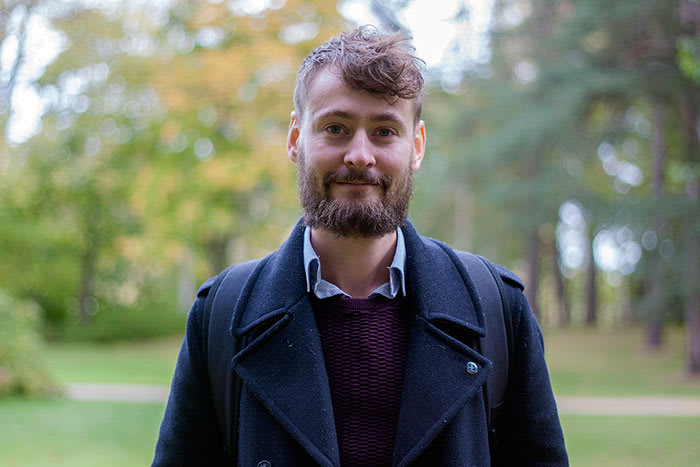Environmental researcher Noah Linder from Urban Studio der University of Gävle.
Photo: Anna Sällberg for © University of Gävle, 2018
The realization is there. Still nothing changes.
Noah Linder is an environmental researcher at the Urban Institute at Gävle University in Sweden. In a recent study on mynewsdesk he says we talk a lot about how technological innovation can help meet the challenges the world is currently facing. But the real problem is that we are not yet using all the technical possibilities that are available to us today:
"We understand it, but we don't change anything, and it is precisely this refusal to change that is another hurdle to overcome and a much greater one than people realize. That's why we need to incorporate psychology into environmental research to help explain the complexity of human behaviour and that of behavioural change," says Noah Linder.
Nudge - small impulses for change
In his research, Noah is concerned with how we can use insights from applied psychology, but also from behavioral psychology in business to achieve sustainable behavioral change. One of these theories is called nudging, which means a small, gentle push in the right direction. The important element in this context is that such impulses are made very gently, with an almost tiny impetus, and that no financial promises are made.
Smaller serving plate, less food RESTE
A study on the Lebens-Mittel Wastage showed that in one hotel, the number of guests was reduced by only 3 centimetre shortened serving platters saved up to 20 percent of food leftovers. In addition, we also tend to select objects that are placed on shelves at eye level, for example in retail stores.
So the nudge principle is about the smallest changes that can have a great effect on our behavior. It's important to remember that anyone can still overfill their platter or reach down to the bottom of the shelf.
Nudges, for example, have also increased the sorting of waste to up to 25 percent. For example, Noah Linder first advised residents in a Stockholm suburb to want to see their food waste sorted 25 percent better. To this end, bio-waste bins were placed in front of numerous buildings, but nobody really wanted to accept them. To change this, a leaflet was printed with the information...
"Do it too! Your neighbour already does."
This leaflet was then handed out together with sorting bags with the aim of making it easier for all residents to start sorting waste and make it a habit.
"Such value-free arguments concerning my own personal living environment often work better than any 'save our environment' argument. If my neighbors do it, it should be the right thing for me."
We need regulatory environments
Often it is simply unclear what is expected of us in public space, Noah thinks. One example of this is litter bins, which are usually designed to fit structurally into the surrounding architecture instead of protruding visibly from it.
"If we want people to throw their rubbish in the bins, we should design bins that are visible from afar and clearly identifiable as such. Then it becomes immediately clear to everyone what the expectations are here in public space."
"Studies have also shown that when we see other people breaking rules, we tend to do the same. For example, if there's a lot of graffiti on the walls somewhere, we immediately throw more on the floor. I want to reverse this and explore how we can create environments that encourage sustainable behavior."
The most sustainable campus worldwide Noah makes it clear to all of us that real-world environments can have a very powerful direct influence on our behavior. The nudge principle presented at the beginning had the same effect on a smaller scale, but now Noah would like to figure out how we should design urban spaces and even complete urban developments in their entirety to be conducive to sustainable behavioral changes in environmental protection. "My focus is on designing environments in the best possible way to encourage people to behave in a specific way. I don't think we can do that with our current urban design." Next spring Noah will travel to Singapore. There he will cooperate with Nanyang Technological University (NTU), one of the top universities in the country. His goal is nothing less than to make the NTU campus the most sustainable in the world.
You can find the study itself by clicking on frontiers in Psychology.

